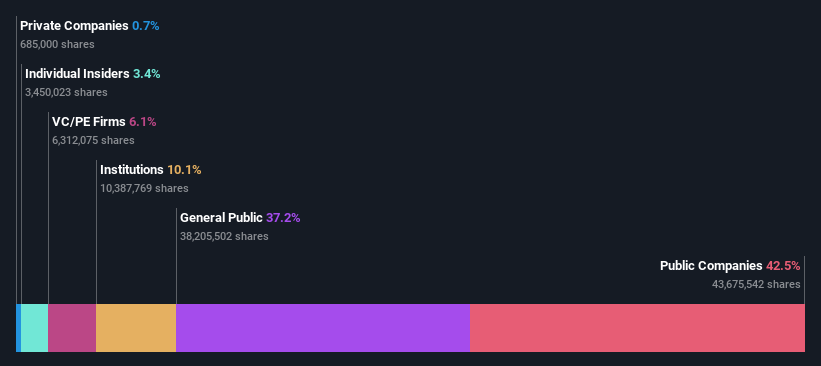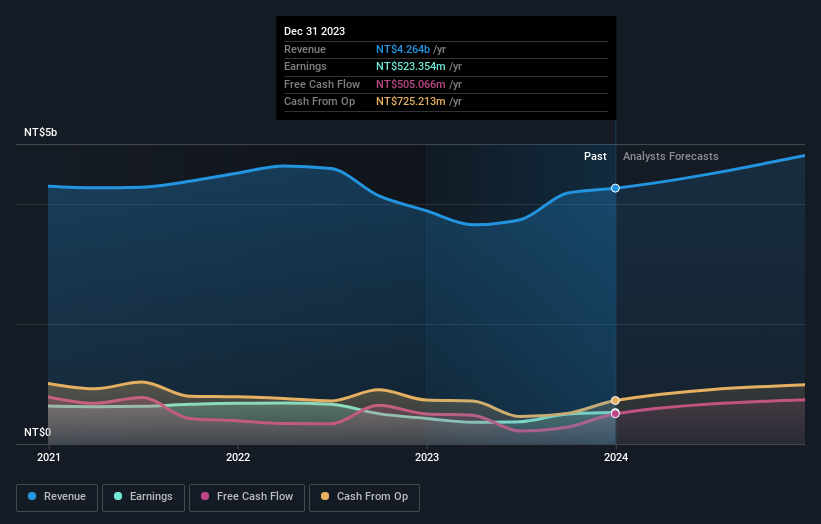Stock Analysis
Public companies invested in Daxin Materials Corporation (TWSE:5234) copped the brunt of last week's NT$2.1b market cap decline

Key Insights
- Daxin Materials' significant public companies ownership suggests that the key decisions are influenced by shareholders from the larger public
- A total of 4 investors have a majority stake in the company with 53% ownership
- Institutions own 10% of Daxin Materials
A look at the shareholders of Daxin Materials Corporation (TWSE:5234) can tell us which group is most powerful. The group holding the most number of shares in the company, around 43% to be precise, is public companies. In other words, the group stands to gain the most (or lose the most) from their investment into the company.
And following last week's 13% decline in share price, public companies suffered the most losses.
Let's take a closer look to see what the different types of shareholders can tell us about Daxin Materials.
See our latest analysis for Daxin Materials

What Does The Institutional Ownership Tell Us About Daxin Materials?
Institutional investors commonly compare their own returns to the returns of a commonly followed index. So they generally do consider buying larger companies that are included in the relevant benchmark index.
Daxin Materials already has institutions on the share registry. Indeed, they own a respectable stake in the company. This implies the analysts working for those institutions have looked at the stock and they like it. But just like anyone else, they could be wrong. When multiple institutions own a stock, there's always a risk that they are in a 'crowded trade'. When such a trade goes wrong, multiple parties may compete to sell stock fast. This risk is higher in a company without a history of growth. You can see Daxin Materials' historic earnings and revenue below, but keep in mind there's always more to the story.

We note that hedge funds don't have a meaningful investment in Daxin Materials. Eternal Materials Co., Ltd. is currently the company's largest shareholder with 23% of shares outstanding. Meanwhile, the second and third largest shareholders, hold 19% and 6.1%, of the shares outstanding, respectively.
To make our study more interesting, we found that the top 4 shareholders control more than half of the company which implies that this group has considerable sway over the company's decision-making.
While it makes sense to study institutional ownership data for a company, it also makes sense to study analyst sentiments to know which way the wind is blowing. While there is some analyst coverage, the company is probably not widely covered. So it could gain more attention, down the track.
Insider Ownership Of Daxin Materials
While the precise definition of an insider can be subjective, almost everyone considers board members to be insiders. The company management answer to the board and the latter should represent the interests of shareholders. Notably, sometimes top-level managers are on the board themselves.
Most consider insider ownership a positive because it can indicate the board is well aligned with other shareholders. However, on some occasions too much power is concentrated within this group.
Our most recent data indicates that insiders own some shares in Daxin Materials Corporation. In their own names, insiders own NT$505m worth of stock in the NT$15b company. Some would say this shows alignment of interests between shareholders and the board. But it might be worth checking if those insiders have been selling.
General Public Ownership
The general public-- including retail investors -- own 37% stake in the company, and hence can't easily be ignored. While this group can't necessarily call the shots, it can certainly have a real influence on how the company is run.
Private Equity Ownership
With an ownership of 6.1%, private equity firms are in a position to play a role in shaping corporate strategy with a focus on value creation. Sometimes we see private equity stick around for the long term, but generally speaking they have a shorter investment horizon and -- as the name suggests -- don't invest in public companies much. After some time they may look to sell and redeploy capital elsewhere.
Public Company Ownership
It appears to us that public companies own 43% of Daxin Materials. We can't be certain but it is quite possible this is a strategic stake. The businesses may be similar, or work together.
Next Steps:
It's always worth thinking about the different groups who own shares in a company. But to understand Daxin Materials better, we need to consider many other factors. Take risks for example - Daxin Materials has 3 warning signs (and 2 which are a bit concerning) we think you should know about.
But ultimately it is the future, not the past, that will determine how well the owners of this business will do. Therefore we think it advisable to take a look at this free report showing whether analysts are predicting a brighter future.
NB: Figures in this article are calculated using data from the last twelve months, which refer to the 12-month period ending on the last date of the month the financial statement is dated. This may not be consistent with full year annual report figures.
Valuation is complex, but we're helping make it simple.
Find out whether Daxin Materials is potentially over or undervalued by checking out our comprehensive analysis, which includes fair value estimates, risks and warnings, dividends, insider transactions and financial health.
View the Free AnalysisHave feedback on this article? Concerned about the content? Get in touch with us directly. Alternatively, email editorial-team (at) simplywallst.com.
This article by Simply Wall St is general in nature. We provide commentary based on historical data and analyst forecasts only using an unbiased methodology and our articles are not intended to be financial advice. It does not constitute a recommendation to buy or sell any stock, and does not take account of your objectives, or your financial situation. We aim to bring you long-term focused analysis driven by fundamental data. Note that our analysis may not factor in the latest price-sensitive company announcements or qualitative material. Simply Wall St has no position in any stocks mentioned.
About TWSE:5234
Daxin Materials
Daxin Materials Corporation engage in the research, development, production, and sale of display and key raw materials, and specialty chemicals for semiconductors in Taiwan.
Excellent balance sheet with proven track record and pays a dividend.

